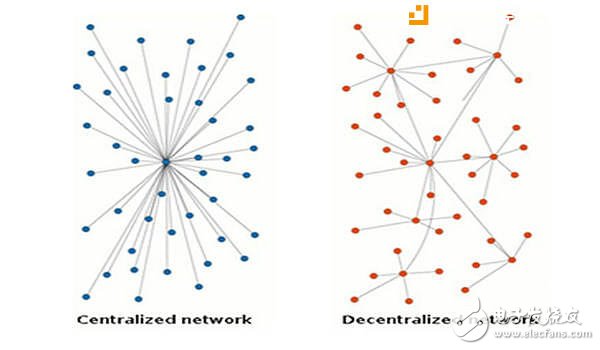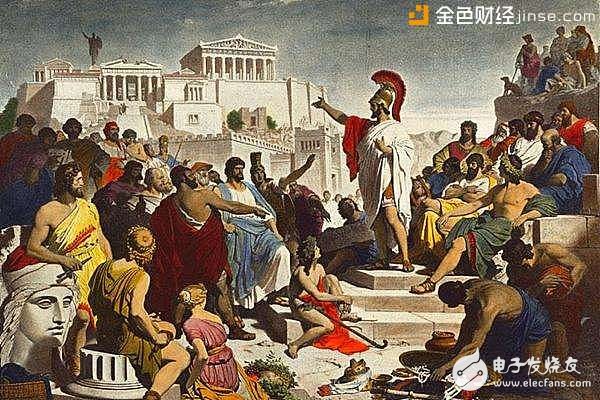Last week was really not a calm week. Many representatives of the two conferences spoke for the blockchain, and Zhou Xiaochuan, governor of the People’s Bank of China, talked about cryptocurrency, currency hacking incidents, blocking and renaming of some cryptocurrency websites, further decline in currency prices, etc. , touched the hearts of people in each blockchain.
Undoubtedly, blockchain is a promising technology application, but it is also undeniable that blockchain concept hype, excessive mythology and one-sided understanding also exist objectively. For example, how do you understand the concept of “decentralization�
Last week, a screenshot of a chat about the internal voice of the founder of OKEx, Xu Xing, was posted on the Internet. Xu Xing said that he was ready to donate OKEx to the country. Coincidentally, Xu Mingxing expressed his opinion in the circle of friends yesterday: The term “decentralization†is a major misdirection caused by the translation of the blockchain industry, calling for translation into “peer-to-peerâ€. The rule makers of any blockchain application are the fundamental center. If the country applies the blockchain, it will go to a small center with inefficiency and opacity to better safeguard the party and the country's great center.
On the one hand, this response shows that OKEx will actively respond to the attitude of the national policy, and the other side has also caused us to think. Do we understand the concept of “decentralization†of the wrong blockchain? Is “decentralization†a revolution across the ages or a utopia of self-indulgence?

Centralized network (left) and decentralized network (right)
Decentralization is an important concept in the blockchain. From the technical point of view, the blockchain is based on distributed ledger technology. The popular explanation is that data is not stored in one or several servers (nodes). Instead, it is scattered and stored in many computers (nodes) on the Internet. This is called decentralization. Decentralization has many advantages, such as data can not be falsified, fake, because you want to change the data at least 51% of the node data. If the nodes are large enough, it is almost impossible to tamper with the data.
In summary, the data is distributed and stored, which can be said to be the specific implementation method of decentralization, and the implementation of it requires the support of peer-to-peer network. To explain briefly, point-to-point means that each networked device (node) transfers shared data to each other, instead of the user accessing one or several central servers (nodes) to get the data. Therefore, OKEx Xu Star called for the translation of “decentralization†into “peer-to-peerâ€, which is based on reason and reason.
Translating “decentralization†into “peer-to-peer†may remove some misunderstandings and misleading, but what does this misunderstanding mean?
I have already explained what decentralization is, but there are some articles, some blockchain projects, intentionally or unintentionally describing decentralization as a kind of management (regulation) from the government, organization group or intermediary. Not controlled by anyone, it is an autonomous ecosystem, and bitcoin is the best example. Moreover, they believe that decentralization is the essence of blockchain technology and can solve the pain points of many industries. For example, we deposit and withdraw money at banks and purchase wealth management products. Banks are so-called centralized institutions, and this kind of intermediary is easy to produce opaque and black-box operations. Obviously, this discourse has deviated from the scope of technology and has become a philosophical thinking or methodology.

Ancient Greek democracy that looks beautiful
Xiao Bian sometimes feels that "decentralization" means "idealized democracy". Idealized democracy and freedom existed in ancient Greek civilization. This kind of utopian social system sounds like a mirror in the real world. Unable to maintain due to serious defects. Later, after a long period of time, the ancient Greek-style absolute democracy evolved into a modern democracy that looked less liberal but more perfect.
Now some people say that decentralization is similar to the ancient Greek idealized democracy. It does not require centralized centralization managers. All users (nodes) operate on the basis of the consensus reached, thus eliminating centralization. The issue of opacity and distrust of the institution. Obviously, this kind of understanding or method is not feasible.
First, history has proved that idealized democracy (decentralization) is wrong. To put it bluntly, decentralization is against the existing social system. Secondly, this statement is also logically difficult to justify. If centralization is the root cause of distrust crisis, can we believe a bunch of unknown source code? Obviously, decentralized blockchain applications, only authoritative centralization agencies to supervise, arbitrate, and endorse, will have credibility.
On the other hand, some false blockchain projects that strongly promote decentralization are inherently structured. Whether it is rulemaking, fundraising or token issuance, they are in the hands of the project team, leading to decentralization. It is a paradox in itself.
And, from a technical point of view, complete decentralization will greatly reduce performance. At present, Bitcoin, which has a high degree of decentralization, is completely based on a peer-to-peer network. The actual efficiency is not high and it is a waste of resources. Only about 7 transactions can be processed per second. Therefore, to improve performance and usability, blockchain applications also need to reduce the so-called degree of centralization.
Therefore, the decentralization in the blockchain should be a method of data storage, rather than the need for centralized organization management operations, without the need for centralized public authority supervision. Moreover, the degree of “decentralization†needs to be determined according to the specific application. For example, in the financial field, whether you are based on blockchain technology, it needs to be strictly regulated to ensure the security of investment and transaction. . But if you use it in applications such as games and communities, you can build a decentralized autonomous ecosystem to some extent.
All in all, Xiao Bian believes that the current concept of “decentralization†does have some misunderstandings. If only the “decentralization†is translated into “peer-to-peerâ€, it cannot solve the problem fundamentally. This requires the relevant departments to issue regulatory policies, rationalize the blockchain industry, and guide people to correctly understand the concept and significance of blockchain and “decentralizationâ€.
FTTH Fiber Optical Fast Connectors
Fiber optic fast connector designed for FTTH. It is a new generation of fiber connector used in assembly. It can provide open flow and precast type, which optical and mechanical specification meets the standard optical fiber connector. It is designed for high quality and high eddiciency for installation, the structure of crimping position is a unique design. The hotest products are SC/APC Fast Connectors and SC/UPC Fast Connectors.

FTTH Fiber Optical Fast Connectors,FTTH SC/UPC Fast Connectors,SC/APC Fast Connectors,LC/APC SM Fast Connectors
NINGBO YULIANG TELECOM MUNICATIONS EQUIPMENT CO.,LTD. , https://www.yltelecom.com